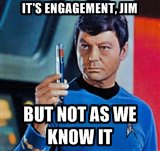Plus ça change ...

Imported from the Blogactiv.eu blogging platform, closed without warning in 2021. Links, images and embeds not guaranteed, and comments not displayed.
An organisation which cannot remember cannot learn; an organisation which cannot learn cannot improve.
Sometime during the EuropCom conference, I found myself listening to someone explaining how the Commission is reorganising the EUROPA site along thematic lines. "But the thematic portal architecture was adopted in 2001," I said. He hadn't heard - he'd only been in the Commission 4 years.
Plus ça change. I also heard, later that day, about the latest EC web app to be 'Corporatised' (made available to all DGs of the Commission). Specifically designed to publish time-critical content online, enewsletter and RSS, it works across organisational siloes and can publish news, calendar items, funding oppportunities, videos, publications and more into any EC website, whatever the CMS. Its called the 'Newsroom'.
"But that was developed for thematic portals in 2002," I said. Several other DGs had adopted it by 2005. Has it really taken the Commission 12 years to Corporatise it? And during my participation session, I mentioned that the EC's first successful eparticipation site had been built in 2002 around DG INFSO's major annual conference. I think under 5 people there knew of it.
Fact of the day at #EuroPCom - listening to @mathewlowry on the first @EU_Commission Web 2.0 site launched 12 years ago! — Peter Hughes (@PeterLingua) October 15, 2014
The only person there who mentioned to me that she knew of it told me that that she'd heard engagement "wasn't that great". I could only point to my last event, 2006, when the longlist of Networking sessions published for crowd-driven selection got over 8000 comments in the first month. Which was August. She hadn't heard that - she'd only been in the Commission 3 years. Plus ça change.
Aside: I later looked up the 2013 site. A lot of participants chose to create a Public Profile, the first stage of active engagement, but it's not possible to see how much actual engagement took place. The Web has evolved a lot since this approach was piloted - people chatter more on social media than comment on content these days. Just ask Fabio about Medium.
Original link
This has important implications for eParticipation. At the Participation session, the difference between sharing and discussion was a significant topic: too much emphasis on social media metrics was seen by many there as a sign of 'democracy washing', where the focus is on getting Retweets and Pageviews, not harvesting new ideas and networks.
But if people are commenting less (a widely documented fact) and sharing more (often without reading what they're sharing - another indisputable fact) where does that leave eParticipation? Should one equate Likes with endorsement of a policy option, or would that be measuring the wrong thing? But that, the state of the Big Internet and the inevitable backlash, are subjects for other posts. /Aside
The purpose of this post is not to secure my place as a Grumpy Old Man. My thinking has evolved a lot since 2002, too, thank goodness. There's nothing worse than being stuck in the past.
I am mentioning this because if the above happened to one person in one week, I wonder how many other good practices, useful code and tools, relevant experience and more have been piloted, tested, documented and forgotten over the years?
An organisation which cannot remember cannot learn, and an organisation which cannot learn cannot improve. How can the Institutions better remember and learn from their own projects, when so many of their staff are temporary, arriving and leaving within 3 years?
Related reading
More Stuff I Think
More Stuff tagged intranet , event , innovation , eparticipation , learning , social media
See also: Online Community Management , Social Media Strategy , Content Creation & Marketing , Digital Transformation , Innovation Strategy , Communications Tactics , Social Web , Business